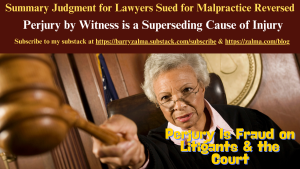Perjury by Witness is a Superseding Cause of Injury

Post 4910
See the full video at https://rumble.com/v5ibjlh-summary-judgment-for-lawyers-sued-for-malpractice-reversed.html and at https://youtu.be/-FdZIy6hD6w
In GMG Insurance Agency v. Margolis Edelstein, No. 213,2023, Supreme Court of Delaware (October 8, 2024) reversed summary judgment in favor of lawyers faced with a claim of professional negligence relating to legal services provided to GMG Insurance Agency.
The Margolis Edelstein (“Margolis”) law firm defended GMG and Howard Wilson, a GMG employee, in a noncompete action brought by Lyons Insurance Agency, Inc. in the Court of Chancery. After GMG failed to prevail fully on its motion for summary judgment in the Court of Chancery, GMG fired Margolis and at the same time also fired Wilson.
On the eve of trial, with GMG represented by new counsel and Wilson represented by separate counsel, Wilson filed an affidavit recanting his prior testimony. Wilson’s new sworn statements were drastically inconsistent with his prior testimony and unfavorable to GMG. GMG, with its defenses obliterated by the perjured statement settled its part of the litigation for $1.2 million.
GMG then sued Margolis. GMG asserted that but for Margolis’s negligent representation in the Court of Chancery, GMG would not have been exposed to the consequences of Wilson’s eleventh-hour change in testimony. The Superior Court granted summary judgment in favor of Margolis.
FACTUAL AND PROCEDURAL BACKGROUND
The Court of Chancery Litigation
Lyons sued Wilson and GMG seeking injunctive relief and money damages. Lyons claimed that Wilson’s employment with GMG breached his non-compete agreement with Lyons, and that GMG aided and abetted that breach and tortiously interfered with the agreement between Lyons and Wilson. GMG retained Margolis to represent itself and Wilson in the Chancery Litigation.
The Court of Chancery granted summary judgment in favor of GMG on all counts except for Lyons’s tortious interference claim. The court also held that Wilson had breached his non-compete agreement with Lyons.
As predicted Wilson filed an affidavit “disavow[ing] and recant[ing] any prior sworn testimony inconsistent with” his new affidavit (the “Wilson Affidavit”). GMG paid $1.2 million to settle the claims against it in the Chancery Litigation.
ANALYSIS
To prevail on a claim of legal malpractice, a plaintiff must establish the following elements: (i) the employment of the attorney; (ii) the attorney’s neglect of a professional obligation; and (iii) resulting loss. Regarding the last element, “the plaintiff must demonstrate that the underlying action would have been successful but for the attorney’s negligence.”
The Supreme Court found Superior Court erred in three ways.
granting summary judgment for Margolis because there are disputes of material fact as to whether Margolis’s representation of GMG in the Chancery Litigation breached the standard of care owed by Delaware attorneys.
failing to address GMG’s contention that, but for Margolis’s alleged negligence, GMG would have prevailed on all claims in the Chancery Litigation.
concluding as a matter of law that the Wilson Affidavit was a superseding cause that broke the causal chain leading to the settlement of the Chancery Litigation.
The Court of Chancery granted summary judgment in favor of GMG. This ruling alone evidences the competence and diligent representation of GMG by Margolis prior to termination.
GMG also contends that Margolis committed malpractice by simultaneously representing GMG and Wilson in the Chancery Litigation despite a potential conflict of interest. Because the factual record and the reasonable inferences to be drawn from it could support a finding in GMG’s favor on its allegations of negligence, the Superior Court erred in granting summary judgment in favor of Margolis.
The Superior Court Erred In Concluding That The Wilson Affidavit Was A Superseding Cause As A Matter Of Law.
To break the causal chain and make an intervening cause a superseding one, the intervening act or event itself must have been neither anticipated nor reasonably foreseeable by the original tortfeasor. However, evidence did not show Margolis could reasonably foresee twenty months before the execution of the Wilson Affidavit-that Wilson would perjure himself by changing his prior sworn testimony with the Wilson Affidavit. Therefore, the Supreme Court found the Wilson Affidavit was a superseding cause that broke the causal chain leading to the settlement of the Chancery Litigation.
Margolis is not relieved from liability because it could not foresee the precise event that might lead to, or trigger, the adverse litigation result. It was sufficient that it could foresee that GMG remaining as a defendant in the Chancery Litigation could lead to an unhappy ending.
The Superior Court’s erroneous and reversible conclusion that the Wilson Affidavit was, as a matter of law, a superseding cause of GMG’s damages resulted in the Superior Court’s error in granting Margolis Edelstein’s motion for summary judgment.
Adding to the judgment with a concurring opinion Chief Justice SEITZ noted that Wilson’s pre-affidavit testimony, by itself, was most likely perjury in the Court of Chancery litigation and fraud between the parties to that case. But if GMG then used Wilson’s false testimony to prop up its separate legal malpractice action, it qualifies as a fraud on the court and GMG would be converting fraud between the parties into a fraud on the court. On remand, the Superior Court should decide whether this is the case. If so, GMG’s case should be dismissed as a sanction for its misconduct.
Lawyers, although they try, are neither perfect nor clairvoyant. Lawyers, judges, and every human will err. The trial judges erred and the plaintiff, GMG, tried to use Wilson’s perjury to possibly create a fraud on the court which attempt could result in a dismissal of the case for its misconduct, the case remaining is ripe for an agreed settlement to avoid a terminating sanction.
 (c) 2024 Barry Zalma & ClaimSchool, Inc.
(c) 2024 Barry Zalma & ClaimSchool, Inc.
Please tell your friends and colleagues about this blog and the videos and let them subscribe to the blog and the videos.
Subscribe to my substack at https://barryzalma.substack.com/subscribe
Go to X @bzalma; Go to Newsbreak.com https://www.newsbreak.com/@c/1653419?s=01; Go to Barry Zalma videos at Rumble.com at https://rumble.com/account/content?type=all; Go to Barry Zalma on YouTube- https://www.youtube.com/channel/UCysiZklEtxZsSF9DfC0Expg
Go to the Insurance Claims Library – https://lnkd.in/gwEYk
Like this:
Loading…







